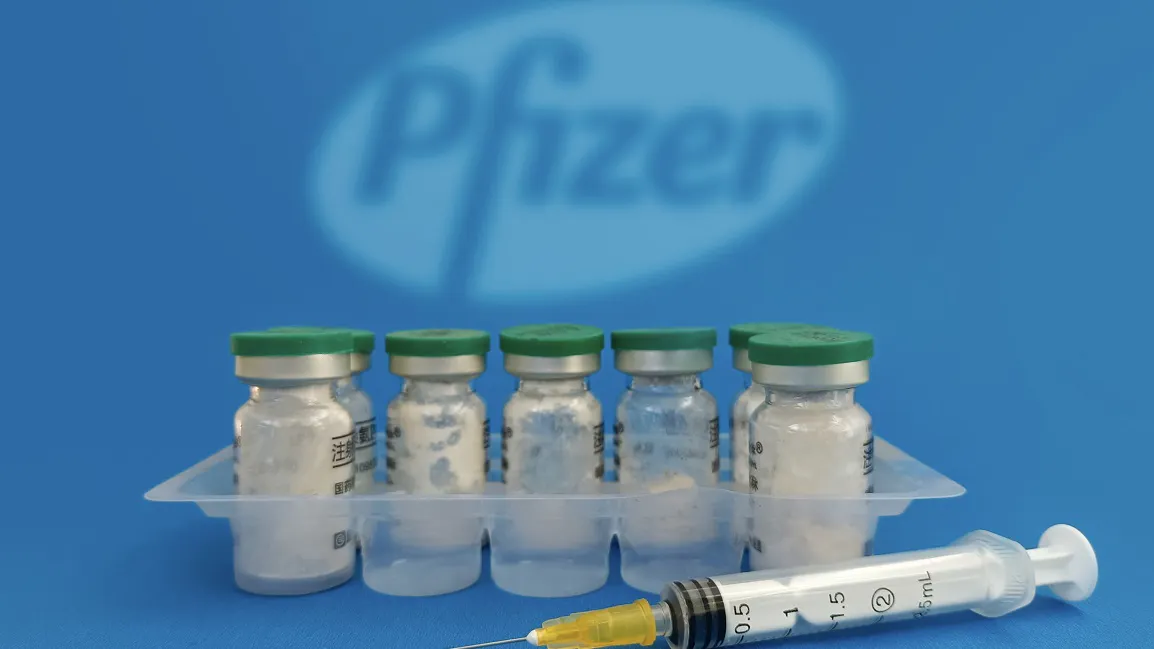Pfizer reaped record sales and profits in 2022, as the pharmaceutical giant’s COVID vaccine and oral treatment helped bring in revenues that topped $100 billion.
In a filing Tuesday with the Securities and Exchange Commission, the Manhattan-based company reported a profit of $31 billion, up 43% over 2021. It said it paid out $9 billion to shareholders in the form of dividends, and spent $2 billion buying back its own stock.
“2022 was a record-breaking year for Pfizer, not only in terms of revenue and earnings per share, which were the highest in our long history,” Chairman and Chief Executive Officer Dr. Albert Bourla said in the report.
The $100 billion in sales was up $19 billion over 2021, and Pfizer’s operational growth was “driven primarily” by its COVID vaccine called Comirnaty and its oral COVID treatment called Paxlovid, the filing said.
Even as COVID boosters have had mixed results in stopping the contraction and spread of COVID–and have been linked to “adverse reactions” which can be more serious than the risk of COVID itself–Pfizer expects to make billions on COVID products in the upcoming year.
For Comirnaty, Pfizer expects that 24% of the U.S. population will “receive a vaccine” in 2023, and that each of those people will receive an average of 1.3 doses on average. It believes that Pfizer will dominate 64% of that market, resulting in revenues of $13.5 billion. That’s down 64% compared to 2022, due to expected “lower compliance.”
However, Pfizer’s own calculations seem to suggest little confidence in the vaccine’s ability to prevent infection. It says more people will contract COVID in 2023 because of “waning of population immune protection due to reduced vaccination rates”–but the increase in expected symptomatic COVID cases is negligible, from 110 million to 112 million worldwide (excluding China). The company claims its vaccine lessens the severity of infections, reducing the likelihood of hospitalization.
The company estimates that 17% of those cases will take an oral antiviral treatment, and Pfizer has 90% of that market cornered through Paxlovid. That is expected to bring Pfizer $8 billion in revenue in 2023. It said that the U.S. Government has agreed to purchase about 24 million doses of Paxlovid, with part of that deal being inked in December even though the same month, the Food and Drug Administration “extended the review period” for its New Drug Application. Pfizer is currently limited in its ability to advertise Paxlovid, but a government decision is soon expected that could give it permission for full marketing, it said.
Worldwide, revenues from COVID vaccines and treatments dwarfed those of Pfizer’s other biopharmaceutical products, totaling $57 billion, with all of its cancer treatments combined bringing in only $12 billion.
In 2022, sales of the vaccine in “emerging markets” like Africa declined from $11.4 billion in 2021 to $9.9 billion, while rising in “developed Europe” from $9.3 billion to $10.8 billion and in the “developed rest of the world” from $8.1 billion to $8.3 bilion. Sales in the U.S. rose from $7.8 billion to $8.7 billion.
In “Risks Related to Our Business, Industry and Operations, and Business Development,” Pfizer noted “the possibility of unfavorable new pre-clinical, clinical or safety data and further analyses of existing pre-clinical, clinical or safety data or further information regarding the quality of pre-clinical, clinical or safety data” and “the risk that more widespread use of Comirnaty, the Pfizer-BioNTech COVID-19 bivalent vaccine or Paxlovid will lead to new information about efficacy, safety or other developments, including the risk of additional adverse reactions, some of which may be serious.”
This month, Project Veritas released video in which a man it identified as Jordon Trishton Walker, Pfizer’s director of research and development, strategic operations – mRNA scientific planner, physically skirmished with the undercover journalism group’s founder in order to take in iPad which contained video of Walker saying that the company was considering “directed evolution” of the virus.
“One of the things we’re exploring is like, why don’t we just mutate it [COVID] ourselves so we could create — preemptively develop new vaccines, right?” he said.
“Don’t tell anyone. Promise you won’t tell anyone,” he added. “The way it [the experiment] would work is that we put the virus in monkeys, and we successively cause them to keep infecting each other, and we collect serial samples from them.”
The company did not specifically address the video, but said in a statement that “In the ongoing development of the Pfizer-BioNTech COVID-19 vaccine, Pfizer has not conducted gain of function or directed evolution research.”

.png)
.png)

